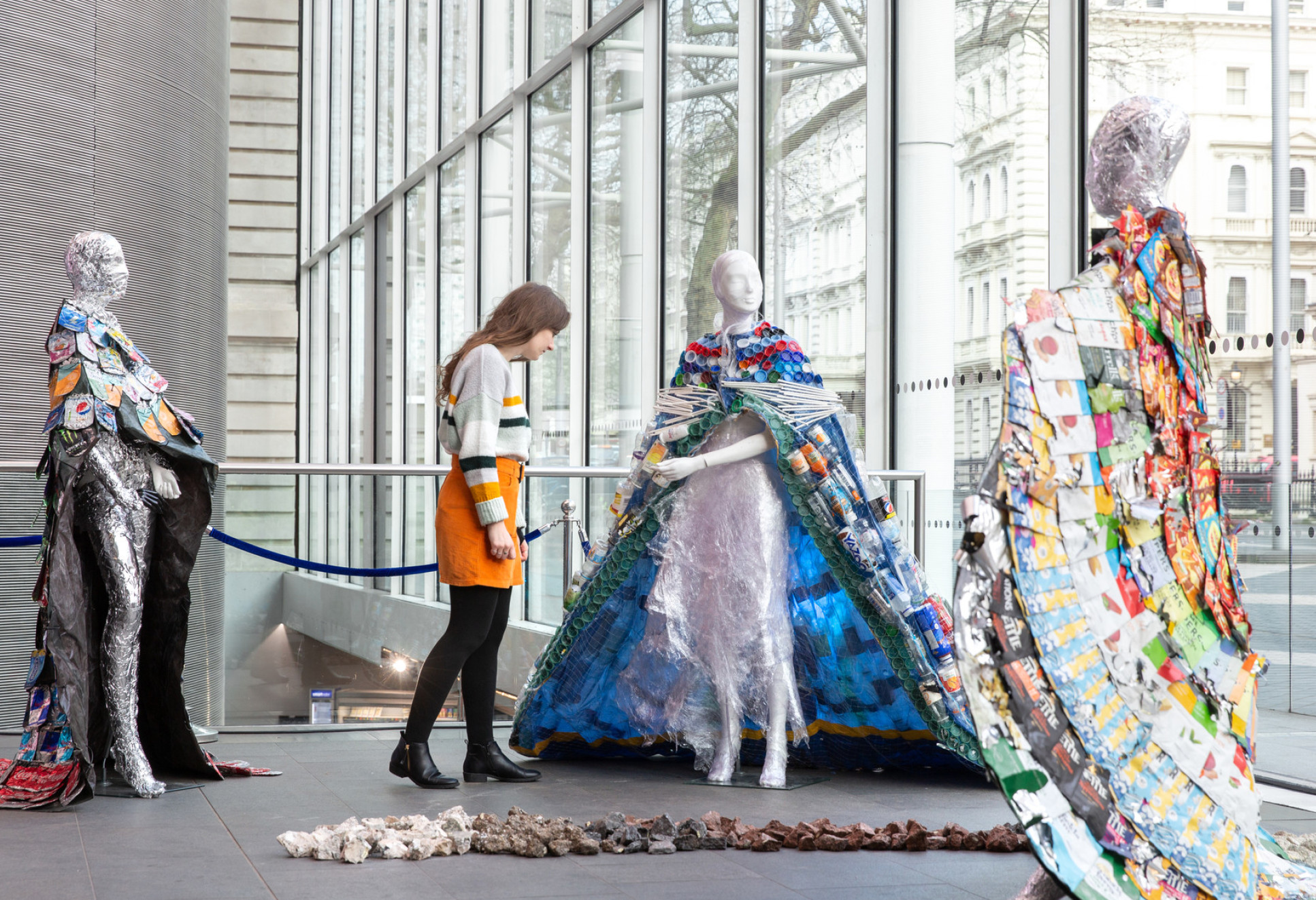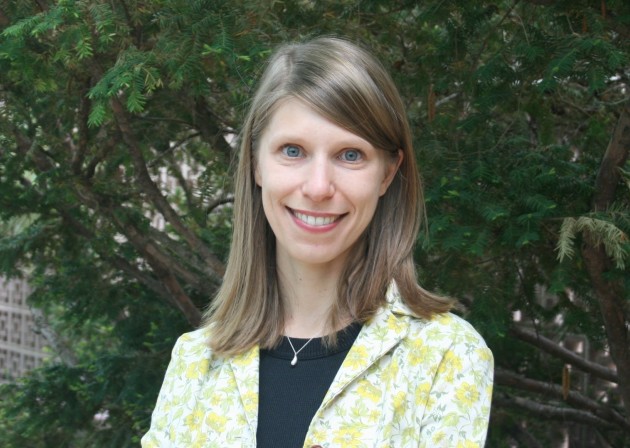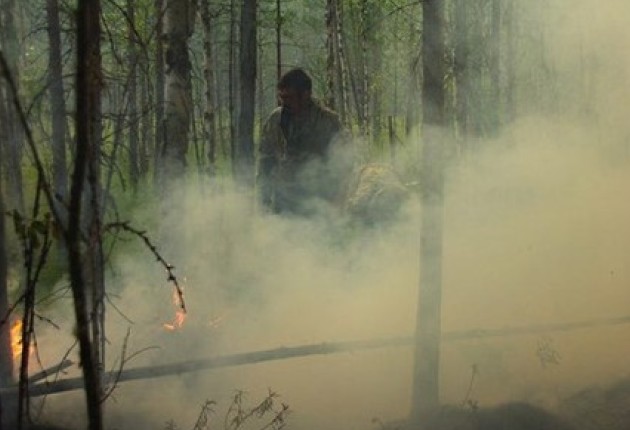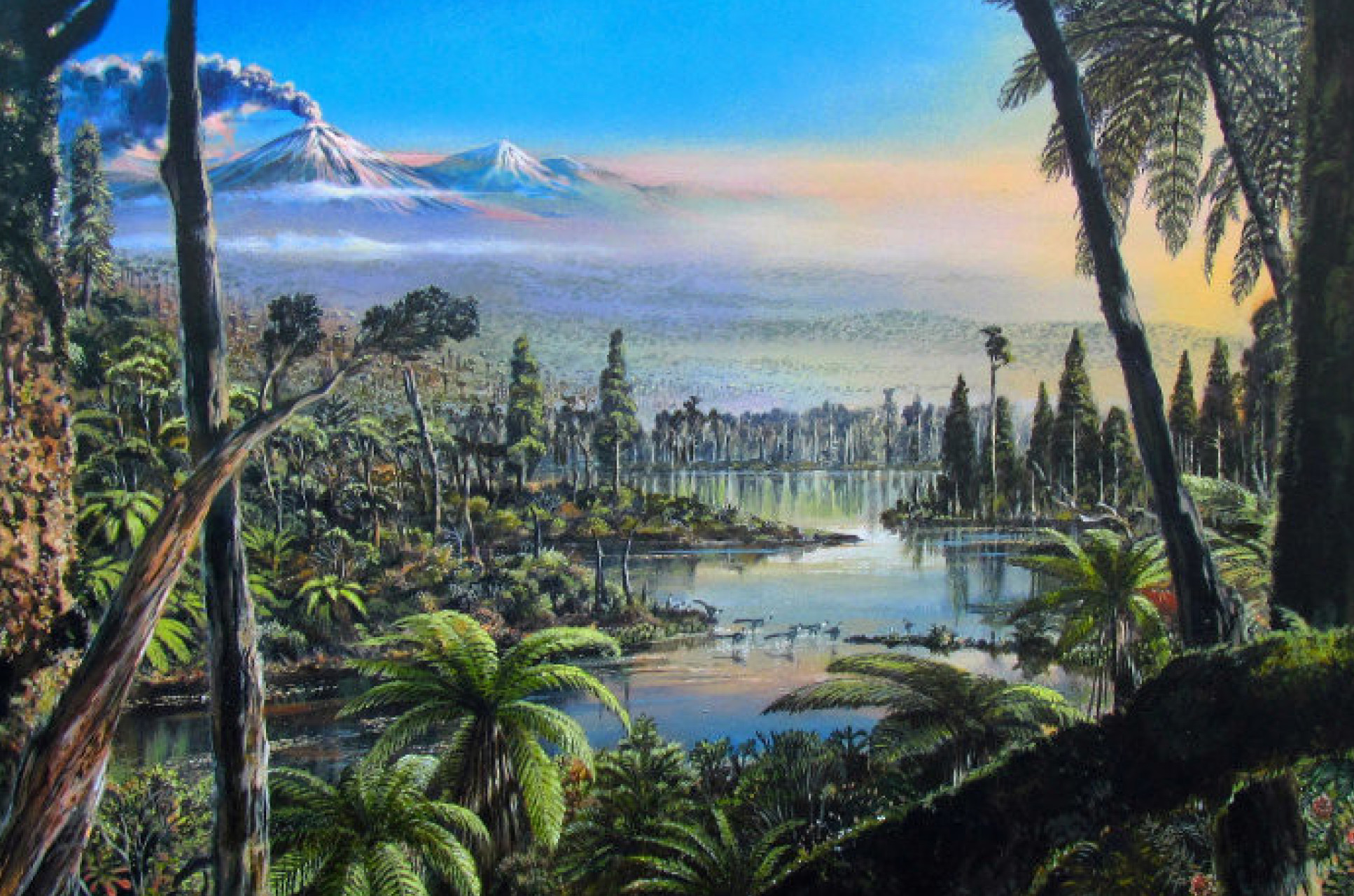 [Fast trashion: This exhibition of garments made from street-litter communicating the crisis of wasted resources appeared in Imperial’s South Kensington Campus Main Entrance. It was part of The Earth And Me (TEAM), a project by the Grantham Institute’s first Artist-in-Residence, Áinne Burke in January 2020. ©Thomas Angus/Imperial College London]
[Fast trashion: This exhibition of garments made from street-litter communicating the crisis of wasted resources appeared in Imperial’s South Kensington Campus Main Entrance. It was part of The Earth And Me (TEAM), a project by the Grantham Institute’s first Artist-in-Residence, Áinne Burke in January 2020. ©Thomas Angus/Imperial College London]
Climate change is already affecting our world. Extreme heat events have continued with an Arctic heatwave, devastating wildfires in Australia and the United States and alarming evidence of melting glaciers across Antarctica. Although the link may appear obvious, scientists have only recently been able to confidently state that climate change is an attributing factor in causing these events. Evidence from corals and ancient forests is helping to better understand where today’s climate fits in with past and future changes. More evidence and first-hand experience, in line with scientists’ expectations, has raised the profile of the problem. A flurry of polls sought to understand peoples’ attitudes to climate change and the good news is that most still want to see changes, despite the COVID-19 pandemic stoking a renewed priority for health and economic concerns. These signals give policymakers and businesses the license they need to embrace a cleaner, greener, fairer future, as well as to prepare and manage the impacts of climate change appropriately.
Climate changed
- Profile: Dr Bonnie Waring, Senior Lecturer at the Grantham Institute and Department of Life Sciences
- Science confirms: climate change Increases the risk of wildfires
- Geological finds shed light on climate of today
- 50 billion years of evolution under threat
- Water management and flooding challenge grows
- Quick reads: Ones to watch
 Dr Bonnie Waring recently relocated from Utah in the United States to London with her husband, young daughter Ramona and cat Fluffles the Hun to join the Grantham Institute. She brings with her a laboratory studying how carbon flows between plants, soils, and the atmosphere, to better understand how an imbalance leads to climate change.
Dr Bonnie Waring recently relocated from Utah in the United States to London with her husband, young daughter Ramona and cat Fluffles the Hun to join the Grantham Institute. She brings with her a laboratory studying how carbon flows between plants, soils, and the atmosphere, to better understand how an imbalance leads to climate change.
While COVID-19 held up her move, Dr Waring led the publication of a discussion paper on the role of forests, in which she exposed the potential environmental, economic and societal benefits of planting trees as part of the global efforts to limit climate change. However, forests are complex and poor planning can increase carbon emissions. She says: “Trees should only be planted in areas that naturally support forest – planting on grasslands, peatlands, or in tundra ecosystems can have unintended consequences that enhance warming.”
She warns that if trees are viewed simply as carbon absorbing machines, without consideration of their other environmental benefits, this can lead to perverse incentives for planting schemes that can damage the envi- ronment and worsen climate change. “Felling existing forests to plant mon- ocultures of fast-growing tree species would likely lead to a net increase in atmospheric carbon dioxide and a loss of biodiversity,” she says.
Dr Waring is keen to engage policymakers and the public with her research and spoke to an audience of both during London Climate Action Week in July 2020.
READ MORE: What role can forests play in tackling climate change?
Imperial voices on climate & environment: Dr Bonnie Waring
 Research from Imperial and the Grantham Institute is shedding new light on the risks that climate change poses to human society and how to avoid its worst effects. Rising global temperatures, more frequent heatwaves and associated droughts in some regions increase the likelihood of wildfires by stimulating hot and dry conditions, promoting fire weather.
Research from Imperial and the Grantham Institute is shedding new light on the risks that climate change poses to human society and how to avoid its worst effects. Rising global temperatures, more frequent heatwaves and associated droughts in some regions increase the likelihood of wildfires by stimulating hot and dry conditions, promoting fire weather.
Professor Colin Prentice, Director of the Leverhulme Centre for Wildfires, Environment and Society, says: “Wildfires can’t be prevented, and the risks are increasing because of climate change. This makes it urgent to consider ways of reducing the risks to people. Land planning should take the increasing risk in fire weather into account”.
In light of devastating Australian fires, a review of 57 studies about global climate change and wildfires, co-authored by Imperial’s Professor Prentice, concluded there was firm evidence that the hot and dry conditions brought about by human-induced warming increased the risk of global wildfires. Studies like this also show how measures, such as land management decisions, can prevent risks turning into fires.
The Grantham Institute stresses the importance of investing in solutions to climate change. Alyssa Gilbert, Director of Policy and Translation at the Grantham Institute, says: “It is the responsibility of governments around the world to take note and prepare properly for these expected changes. We need to make all of our systems – from agriculture, through to infrastructure, as well as softer networks, like social networks and connections – resilient to these changes.”
READ MORE: Climate science research highlights
[Image credit: Tatiana Bulyonkova CC-BY-2.0]
 Researchers have discovered temperate forest soil from the Cretaceous period, 90 million years ago, in Antarctica and an analysis of the preserved roots, pollen and spores points to a warmer prehistoric world. Imperial’s Professor Tina van de Flierdt says: “Even during months of darkness, swampy temperate rainforests were able to grow close to the South Pole,” suggesting the average temperature was around 12°C and it was unlikely the continent had an ice cap.
Researchers have discovered temperate forest soil from the Cretaceous period, 90 million years ago, in Antarctica and an analysis of the preserved roots, pollen and spores points to a warmer prehistoric world. Imperial’s Professor Tina van de Flierdt says: “Even during months of darkness, swampy temperate rainforests were able to grow close to the South Pole,” suggesting the average temperature was around 12°C and it was unlikely the continent had an ice cap.
To better understand the history of the West Antarctic ice sheet, a UK-Chilean collaboration, including Professor van de Flierdt and Grantham Institute Co-Director Professor Martin Siegert, plans to drill deep into Antarctica to obtain the first ever samples of sediments from a lake buried below the thick ice. This will help to answer questions about whether the West Antarctic ice sheet collapsed during past warm periods, and how life can adapt to extreme environments.
[Image: Illustration of the Antarctic rainforest. Credit: Alfred-Wegener-Institut/James McKay]
Unique animals with long evolutionary histories, such as tapirs and pangolins, are under increased threat of extinction around the world. A study led by the Zoological Society of London (ZSL) and Imperial highlights many species that face unprecedented pressure from human activities such as urban development, deforestation and road building. In addition to being vital for their local ecosystems, some species, such as pangolins, carry variants of diseases that can transfer into humans if they come into close contact, as COVID-19 did in 2019.
Lead author Rikki Gumbs, of ZSL’s EDGE of Existence programme and the Science and Solutions for a Changing Planet Doctoral Training Partnership at Imperial, says: “Our analyses reveal the incomprehensible scale of the losses we face if we don’t work harder to save global biodiversity”. In total, at least 50 billion years of evolutionary history is under threat across all land vertebrates, and the co-authors call for them to be a priority for conservation.
EXPLORE: OneZoom tree of life app
Imperial’s public affairs hub, The Forum, held its first online workshop on water management in June 2020. Attendees heard Professor Nick Voulvoulis warn that water supply could fall by 7% by 2045, thanks to climate change, while three billion litres leaks every day in England and Wales.
“Water management and flooding must be balanced with the needs of people and nature, on national, regional and local levels,” said Dr Ana Mijic, who recently completed a Natural Environment Research Council Innovation Fellowship, working with the UK’s Environment Agency to develop a systems approach for water management that can underpin the government’s ‘25 Year Environment Plan’.
Imperial’s Dr Jimmy O’Keeffe, part of Community Water Management for a Liveable London (CAMELLIA) programme, explained how stakeholder engagement is vital to ensure the longevity of projects that harness nature to improve the built environment. CAMELLIA co-sponsored a report by think tank Policy Connect, which details how to make new and existing homes more adaptable to the effects of climate change, making recommendations for better water efficiency, flood resilience and drainage sustainability.
On a global scale, the authors of a new briefing paper found that natural coastal ecosystems like mangroves and coral reefs protect local economies and coastal settlements from flooding, while also making a contribution to slowing climate change.
READ MORE: Resilience for England's homes
Imperial voices on climate & environment: Dr Ana Mijic
The Environmental Research Group has joined Imperial, creating an unrivalled centre in the study of air pollution. Professor Frank Kelly, top advisor to the UK government, leads the group that shaped London’s congestion charge and Ultra Low Emissions Zone (ULEZ). Imperial plans to build on this extraordinary concentration of expertise, which itself comprises 68 researchers, by collaborating with existing world-class experts in NExAir: Imperial’s Air Quality Network.
Imperial earth scientist Professor Chris Jackson will be the first Black person to present one of the Royal Institution’s renowned Christmas Lectures. In the series, famous for popularising science for a young audience and televised on the BBC, he will discuss climate change history and the natural and human processes that drive it. “Role models who positively inspire and support people play a big role in empowerment,” he says. “If Black children don’t see Black scientists in the news or in documentaries […] it’s easy for them to feel that the scientific space isn’t for them.”
A new collaboration between Imperial’s Institute of Global Health Innovation and the Grantham Institute will examine the effects of climate change on mental health and transform our understanding of how the challenges affecting our planet also affect minds, communities and healthcare systems. Neuroscientist Dr Emma Lawrance, designer Pip Batey, and the rest of the Climate Cares team will first examine ‘solastalgia’, distress about the transformation of homelands, and ‘eco-anxiety’, the chronic fear of environmental disaster.
Contact us
General enquiries: grantham@imperial.ac.uk
Media: grantham.media@imperial.ac.uk
Phone us on: +44 (0)20 7594 9666
Privacy Notice
View the Grantham Institute Privacy Notice.
